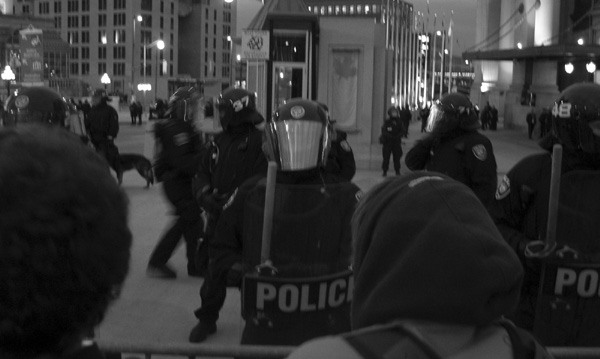Saturday, January 5, 2008
This is a good time to be thinking critically about exceptional detention
January 11, 2008 should be a day for reflection and action. On that day, the US detention facility at Guantanamo will have been in operation for six years. The ACLU is among a number of human rights organizations planning action on the 11th. Among other things, they are calling on opponents of the institution to wear orange on that day. I have five days to find some orange clothing. You can click on the link script at the top of my sidebar to go to the ACLU's excellent online activist toolkit. See also Cageprisoners' planned day of action. I will be blogging on Guantanamo and exceptional detention more generally throughout January.
January 28, 2008 should also be a day for action. On the 28th, the House of Commons reconvenes after its winter holiday. One of the items at the top of the Parliamentary agenda is Bill C-3, the Act to Amend the Immigration and Refugee Protection Act. This legislation has been returned to Parliament after brief review by the Standing Committee on Public Safety and National Security (without significant amendment). It is slated for final reading during the last week of January. In previous posts, I have discussed the political maneuvering that has accompanied this legislation, and the emphasis that has been placed on rushing it through the House. C-3 is the Government's response to the Supreme Court's ruling in Charkaoui. It includes the bare minimum alterations of the IRPA security certificate mechanism required to ensure that the Charter is not being violated (or so the Government says - many argue that the revised IRPA will not hold up to court challenge). The February 23, 2007 ruling in Charkaoui gave the government exactly one year to make the amendments. If February 23, 2008 arrives without C-3 being passed, the Federal Court will have no choice but to strike down any existing security certificates, and the Government will be unable to issue any new ones. They will be forced to either lay criminal charges against the 'Secret Trial Five' or release them.
It is extremely unlikely that the political winds in Ottawa will be blowing against C-3. The Conservatives will obviously vote for their own bill, and the Liberals (who, during their last turn at the helm, issued all of the existing security certificates) will almost certainly go along, (1) because they actually support the security certificate mechanism, (2) because a vote against C-3 would open them to charges of 'flip flopping' and hypocrisy, and (3) because our political process has sunk to such a level that parties will bend over backwards to avoid allegations of being 'soft on terror'.
For a moment, though, we might pretend that C-3 is not a forgone conclusion, and that concerted effort by Canadian citizens might still exert sufficient pressure to make voting in favor of the legislation politically risky. We can use the time before January 28th to ensure that our Members of Parliament understand that we strongly disapprove of C-3 and security certificates, and that we expect them to vote against the bill when the House reconvenes. I recommend writing letters to the effect that a vote in favor of C-3 by your MP will translate to one less ballot cast for them during the next election. For more information on the campaign against security certificates, check out the Justice for Mohamed Harkat website - the planned action for the 15th and 16th should be of particular interest to those in the GTA.
I will be writing my MP on Monday, and I will post the letter here (and the response, if any, when it arrives).
January 2008 could pass as the month that saw the sixth birthday of the abomination that is Guantanamo Bay and the rubber-stamping of a reincarnated secret trial system in Canada. Or, it could pass as the month when citizens gave notice to government that habeas corpus and the rule of law are fundamental principles that cannot be diluted or worked around.
Happy New Year,
- Mike
Posted by Mike Larsen at 9:09 PM
Labels: C-3, security certificates
Subscribe to:
Post Comments (Atom)

No comments:
Post a Comment